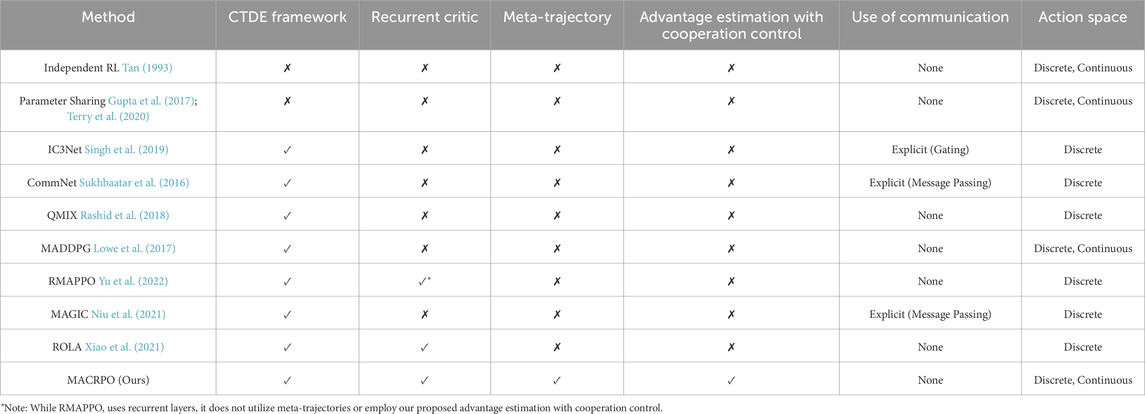- Intelligent Robotics Group, Electrical Engineering and Automation Department, Aalto University, Helsinki, Finland
This work considers the problem of learning cooperative policies in multi-agent settings with partially observable and non-stationary environments without a communication channel. We focus on improving information sharing between agents and propose a new multi-agent actor-critic method called Multi-Agent Cooperative Recurrent Proximal Policy Optimization (MACRPO). We propose two novel ways of integrating information across agents and time in MACRPO: First, we use a recurrent layer in the critic’s network architecture and propose a new framework to use the proposed meta-trajectory to train the recurrent layer. This allows the network to learn the cooperation and dynamics of interactions between agents, and also handle partial observability. Second, we propose a new advantage function that incorporates other agents’ rewards and value functions by controlling the level of cooperation between agents using a parameter. The use of this control parameter is suitable for environments in which the agents are unable to fully cooperate with each other. We evaluate our algorithm on three challenging multi-agent environments with continuous and discrete action spaces, Deepdrive-Zero, Multi-Walker, and Particle environment. We compare the results with several ablations and state-of-the-art multi-agent algorithms such as MAGIC, IC3Net, CommNet, GA-Comm, QMIX, MADDPG, and RMAPPO, and also single-agent methods with shared parameters between agents such as IMPALA and APEX. The results show superior performance against other algorithms. The code is available online at https://github.com/kargarisaac/macrpo.
1 Introduction
While reinforcement learning (RL) (Kaelbling et al., 1996) has gained popularity in policy learning, many problems that require coordination and interaction between multiple agents cannot be formulated as single-agent reinforcement learning. Examples of such scenarios include self-driving cars (Shalev-Shwartz et al., 2016), autonomous intersection management (Dresner and Stone, 2008), multiplayer games (Berner et al., 2019; Vinyals et al., 2019), and distributed logistics (Ying and Dayong, 2005). Solving these kinds of problems using single-agent RL is problematic because the interaction between agents and the non-stationary nature of the environment due to multiple learning agents can not be considered (Hernandez-Leal et al., 2019; Lazaridis et al., 2020). Multi-agent reinforcement learning (MARL) and cooperative learning between several interacting agents can be beneficial in such domains and has been extensively studied (Nguyen et al., 2020; Hernandez-Leal et al., 2019).
However, when several agents are interacting with each other in an environment without real-time communication, the lack of communication deteriorates policy learning. To alleviate this problem, we propose a meta-trajectory-based communication scheme during training, where agents indirectly share information through a centralized critic. By aggregating trajectories from all agents into a meta-trajectory, the critic is able to learn the cooperative dynamics between agents, even in the absence of direct communication during execution. This scheme enables the agents to implicitly learn from each other’s observations and rewards, allowing them to better predict each other’s behavior and adapt accordingly. For example, in applications like autonomous driving at intersections, agents can anticipate the actions of others, improving performance, safety, and cooperation.
A standard paradigm for multi-agent planning is to use the centralized training and decentralized execution (CTDE) approach (Kraemer and Banerjee, 2016; Foerster et al., 2016; Lowe et al., 2017; Foerster et al., 2018; Xiao et al., 2021), which we also adopt in this work. During centralized training, the critic receives global information, including observations and actions from all agents, allowing it to model the inter-agent dynamics. During decentralized execution, each agent uses its own local observations to act independently.
In this work, we propose a new cooperative multi-agent reinforcement learning algorithm, which is an extension to Proximal Policy Optimization (PPO), called Multi-Agent Cooperative Recurrent Proximal Policy Optimization (MACRPO). MACRPO enhances inter-agent coordination through two key mechanisms: First, it uses a recurrent long short-term memory (LSTM) layer in the critic network, trained with a meta-trajectory that combines trajectories from all agents (see Figure 1). This enables the critic to capture the temporal dynamics and interactions between agents over time, while also handling the partial observability of each agent. Second, MACRPO introduces a novel advantage function estimator that incorporates both the rewards and value functions of other agents, controlled by a cooperation parameter. This allows MACRPO to adjust the level of cooperation, which is particularly useful in environments where agents cannot fully cooperate, balancing individual and collective rewards.
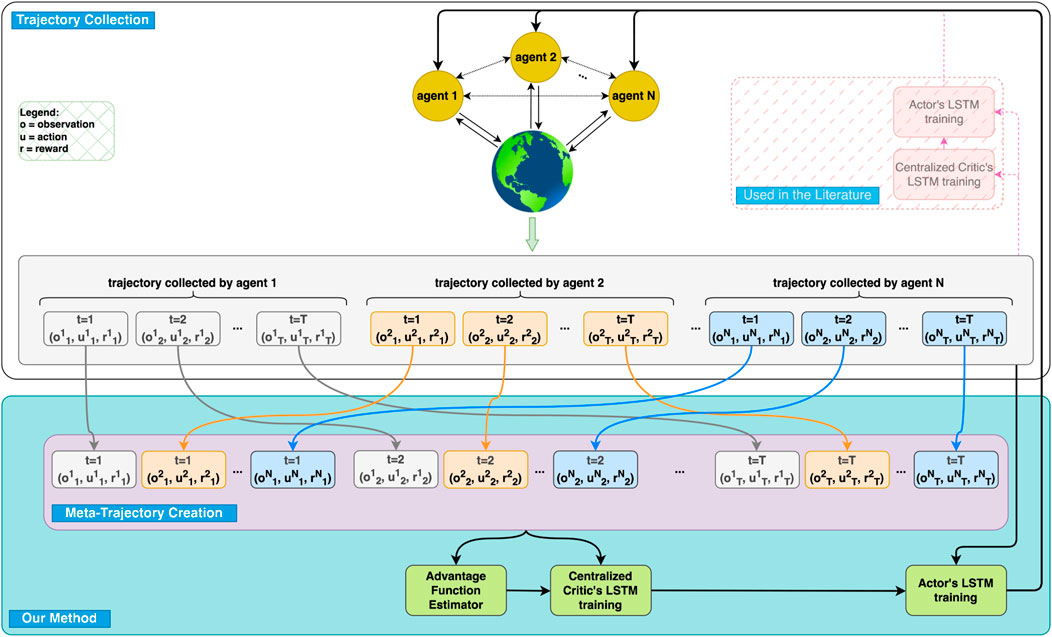
Figure 1. Overview of the Multi-Agent Cooperative Recurrent Proximal Policy Optimization (MACRPO) Framework. This figure illustrates the key components of our proposed method (shown with full opacity) compared to conventional approaches in the literature (shown with transparency). In our method, each agent collects trajectories consisting of observations (o), actions (u), and rewards (r) over multiple time steps. These individual trajectories are then combined into a meta-trajectory, which is fed into both the advantage function estimator and the centralized critic’s LSTM. The advantage function estimator (added in our method) calculates each agent’s advantage by considering both individual and shared rewards, thereby allowing us to control the cooperation level between agents. This calculated advantage helps the centralized critic’s LSTM to better learn the dynamics and cooperation between agents. During decentralized execution, only the actor networks are used, trained independently for each agent. In contrast, conventional approaches use separate trajectories and do not incorporate meta-trajectory or cooperative advantage estimation.
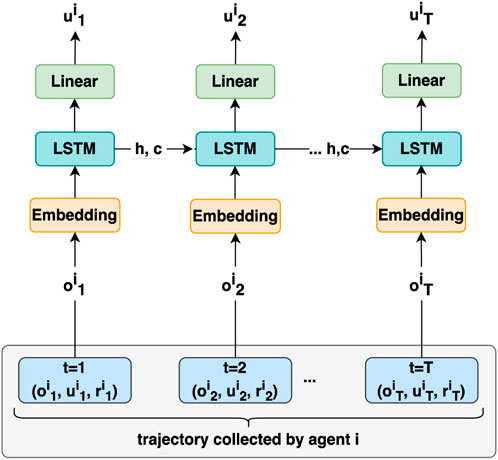
Figure 2. Actor Network Architecture for agent
MACRPO operates under the centralized training and decentralized execution paradigm. During training, the centralized critic leverages the meta-trajectory to sequentially predict the value of a state for each agent, enabling it to learn the cooperative strategies between agents. During execution, the decentralized actor networks use only local observations, ensuring that each agent acts autonomously without requiring real-time communication.
Moreover, in environments where multiple agents are simultaneously learning during training, each agent’s policy and the environment’s dynamics are constantly changing from the perspective of other agents, resulting in non-stationarity (Hernandez-Leal et al., 2019; Xiao et al., 2021). To mitigate this issue, MACRPO employs an on-policy approach, ensuring that the most recent data collected from the environment is used for training.
In summary, our contributions are as follows: (1) We propose a cooperative on-policy centralized training and decentralized execution framework that is applicable to both discrete and continuous action spaces. (2) We introduce two novel mechanisms for information sharing across agents: (a) a recurrent LSTM component in the network architecture that integrates meta-trajectories to capture inter-agent cooperation over time, and (b) an advantage function estimator that combines individual rewards and value functions with a control parameter, which allows the level of cooperation between agents to be dynamically adjusted. This dual mechanism enables superior policy learning and adaptability compared to prior approaches, as demonstrated in our experiments. (3) We evaluate MACRPO on three cooperative multi-agent tasks: DeepDrive-Zero (Quiter, 2020), Multi-Walker (Gupta et al., 2017), and Particle (Mordatch and Abbeel, 2018), showing that it achieves comparable or superior performance against state-of-the-art methods.
The rest of this paper is organized as follows. The review of related works in Section 2 demonstrates that while MARL has been extensively studied, existing approaches do not address the dynamics of interaction between agents in detail. In Section 3, we provide the required background in Markov Games and Proximal Policy Optimization. The problem definition and the proposed method are described in Section 4, with emphasis on the two innovations, meta-trajectory for recurrent network training and joint advantage function. Then, Section 5 presents empirical evaluation in three multi-agent environments showing superior performance of the proposed approach compared to the state-of-the-art. Finally, in Section 6 we conclude that implicit information sharing can be used to improve cooperation between agents while discussing its limitations in settings with a high number of agents.
2 Related work
The most straightforward and maybe the most popular approach to solving multi-agent tasks is to use single-agent RL and consider several independent learning agents. Some prior works compared the performance of cooperative agents to independent agents and tried independent Q-learning (Tan, 1993) and PPO with LSTM layer (Bansal et al., 2017), but they did not work well in practice (Matignon et al., 2012). Also, Zhao et al. (2020) tried to learn a joint value function for two agents and used PPO with an LSTM layer to improve the performance in a multi-agent setting.
In order to use single-agent RL methods for multi-agent settings, improve the performance, and speed up the learning procedure, some works used parameter sharing between agents (Gupta et al., 2017; Terry et al., 2020). Especially in self-play games, it is common to use the current or older versions of the policy for other agents (Berner et al., 2019). We will compare our proposed method with several state-of-the-art single-agent RL approaches with shared parameters between agents proposed in Terry et al. (2020) in the experiments section. Our way of training the LSTM layer in the critic differs from parameter sharing used in the literature such that instead of using separate LSTMs for each agent, the LSTM layer in our method has a shared hidden state, which is updated using a combination of all agents’ information. This lets the LSTM layer learn about the dynamics of interaction and cooperation between agents across time.
In addition to using single-agent RL methods with or without parameter sharing, some works focus on designing multi-agent RL algorithms that incorporate communication between agents to enhance coordination in multi-agent settings. Communication in multi-agent environments can significantly improve learning and performance by enabling agents to share information (Niu et al., 2021; Singh et al., 2019; Liu et al., 2020; Sukhbaatar et al., 2016; Dutta et al., 2005; Da Silva and Costa, 2019; Kash et al., 2011). However, the effectiveness of communication often depends on the availability and optimization of the communication channels. IC3Net (Singh et al., 2019) introduces a communication gating mechanism, allowing agents to learn when to communicate with each other during cooperative and competitive tasks. While IC3Net leverages communication between agents to improve coordination, it assumes that a communication channel is available during execution. In some real-world scenarios, such as autonomous driving, direct communication between agents may not be feasible. In such environments, agents must learn to cooperate without explicit communication. Unlike IC3Net, MACRPO addresses this challenge by enabling indirect information sharing during the training phase through a meta-trajectory that combines the experiences of all agents. This meta-trajectory allows agents to implicitly learn cooperation strategies without requiring explicit communication during execution, making MACRPO well-suited for environments where communication is restricted or absent.
A recently popularized paradigm for sharing information between agents is the use of centralized training and decentralized execution. In general, we can categorize these types of approaches into two groups: value-based and actor-critic-based. In value-based methods, the idea is to train a centralized value function and then extract the value functions for each agent from that to act in a decentralized manner in the execution time (Sunehag et al., 2018; Rashid et al., 2018). On the other hand, the actor-critic-based methods have actor and critic networks (Lowe et al., 2017; Foerster et al., 2018). The critic network has access to data from all agents and is trained in a centralized way, but the actors have only access to their local information. They can act independently in the execution time. The actors can be independent with individual weights (Lowe et al., 2017) or share the policy with shared weights (Foerster et al., 2018). In this work, we use an actor-critic-based method with centralized training and decentralized execution, providing two innovations to improve information sharing without a communication channel between agents during execution.
RMAPPO (Yu et al., 2022) is a method close to ours, which uses the CTDE framework. They make no mention of recurrent neural networks (RNNs) in their paper, but their code contains recurrent layers. RMAPPO focuses primarily on adapting PPO components such as clipping, mini-batching, batch size, value normalization, and value function input representation for multi-agent environments. However, the main distinction between our work and theirs lies in the meta-trajectory we generate from the data of all agents, and the specific manner in which we employ the RNN layer. RMAPPO employs CTDE and RNNs as usual without a combined trajectory as input, which limits its ability to model interactions between agents over time. In addition to the meta-trajectory, another difference is in the way information is shared. While both methods share policy parameters across agents, RMAPPO uses a shared reward function for all agents that is the sum of individual rewards, without any control over the degree of cooperation. In contrast, MACRPO introduces a novel advantage function estimator that incorporates a control parameter, allowing us to dynamically adjust the level of cooperation between agents. This provides greater flexibility in environments where the degree of cooperation must vary dynamically over time. Furthermore, while RMAPPO is tested primarily in environments with discrete action spaces, MACRPO is evaluated in both discrete and continuous action spaces, demonstrating its broader applicability.
In Foerster et al. (2018), which is another work near ours, the actor is recurrent, but the critic is a feed-forward network, whereas our actor and critic are both recurrent, and the recurrent layer in our critic has a crucial role in our method. Their method is also for settings with discrete action spaces, whereas we test our method on three environments with both discrete and continuous action spaces.
ROLA (Xiao et al., 2021) is another work near ours. They use LSTMs in both actor and critic networks. Additionally, ROLA employs both centralized and individual asymmetric critics that estimate individual advantage values using local history and/or state information. However, we construct the meta-trajectory which has not only the history of each agent but also the history of the interaction between agents and the environment’s dynamics. In addition, we propose a novel advantage function estimator which is a combination of all agents’ advantage functions and the cooperation level of agents can be changed based on the problem using a control parameter.
Durugkar et al. (2020) is also a work that combines an agent-specific reward and an environment-specific reward to accomplish the shared task. They consider a framework that uses a linear mixing scheme to balance individual preferences and task rewards. They demonstrate that in their test environments, a small amount of selfishness and not full cooperation can be advantageous and facilitate team learning. In our test environments and with our framework, full cooperation among agents yields superior performance. Depending on the environment, the amount of cooperation and selfishness can be different.
The other similar work to ours, which is one of the most popular MARL methods, is the multi-agent deep deterministic policy gradient (MADDPG) (Lowe et al., 2017) that proposed similar frameworks with centralized training and decentralized execution. They tested their method on some Particle environments (Mordatch and Abbeel, 2018). Their approach differs from ours in the following ways: (1) They do not have the LSTM (memory) layer in their network, whereas the LSTM layer in the critic network plays a critical role in our method. It helps to learn the interaction and cooperation between agents and also mitigate the partial observability problem. (2) They tested MADDPG on Multi-Agent Particle Environments with discrete action spaces. However, we test our method in both continuous and discrete action space environments. (3) They consider separate critic networks for each agent, which is beneficial for competitive scenarios, whereas we use a single critic network and consider the cooperative tasks. (4) Their method is off-policy with a replay buffer, and they combat the non-stationarity problem by centralized training. In contrast, our approach, in addition to centralized training, is an on-policy method without a replay buffer allowing the networks to use the most recent data from the environment. We will compare our method with MADDPG and show that ours has comparable or superior performance. Wang et al. (2020) extends the MADDPG idea and adds a recurrent layer into the networks, but they have separate actors and critics for agents, similar to MADDPG, and recurrent hidden states of critics are isolated, and there is no combination of information in them. They also tested their method on one environment with a discrete action space.
We target problems where agents attempt to collaboratively maximize the sum of all agents’ expected rewards but where each agent receives its reward. We do not specifically consider the credit assignment problem for multi-agent games where all agents have a shared team reward. The proposed algorithm can be applied to such problems, but it is not designed for them.
To provide a clearer comparison, Table 1 summarizes the key differences between MACRPO and other state-of-the-art methods. The table highlights the distinctive features of MACRPO, such as the use of meta-trajectories and a novel advantage estimation mechanism with a cooperation control parameter, which are not present in other approaches.
3 Background
3.1 Markov games
In this work, we consider a multi-agent extension of Partially Observable Markov Decision Processes (MPOMDPs) (Gmytrasiewicz and Doshi, 2005), also called partially observable Markov games (Littman, 1994). It can also be modeled as Partially Observable Stochastic Games (POSGs) (Hansen et al., 2004). A Markov game for N agents is defined by a set of states
3.2 Proximal policy optimization
Proximal Policy Optimization (PPO) is a family of policy gradient methods for solving reinforcement learning problems, which alternate between sampling data through interaction with the environment and optimizing a surrogate objective function using stochastic gradient descent while limiting the deviation from the policy used to collect the data (Schulman et al., 2017). PPO aims to maximize the clipped expected improvement of the policy (Equation 1).
where
In addition to the expected improvement, the total objective function for PPO incorporates a loss function for a critic network required for GAE and an entropy bonus term to encourage exploration, resulting in the total objective (Equation 2) (Schulman et al., 2017).
where
In the above equations,
4 Methods
In this section, we introduce the problem setting and provide an overview of our proposed solution. We then describe the two key components of our approach in detail: (1) a centralized critic based on a recurrent neural network (RNN), which utilizes a novel meta-trajectory to capture inter-agent dynamics, and (2) an advantage estimation technique that incorporates weighted rewards, controlled by a parameter to adjust the level of cooperation between agents. Finally, we present a summary of the proposed MACRPO algorithm.
For clarity, a detailed description of all symbols and variables used in the equations throughout the manuscript is provided in the Nomenclature (Supplementary Appendix A1).
4.1 Problem setting and solution overview
Multi-agent systems operating in partially observable environments face significant challenges due to limited information and the absence of direct communication between agents. These factors hinder agents’ ability to coordinate effectively and learn optimal policies, which can lead to suboptimal performance in cooperative tasks. Effective information sharing among agents is critical for improving performance and accelerating learning in multi-agent reinforcement learning (MARL) (Gupta et al., 2017; Foerster et al., 2018; Terry et al., 2020). In this work, we aim to enhance information sharing in multi-agent environments, going beyond the traditional approach of merely sharing parameters across actor networks.
We introduce the Multi-Agent Cooperative Recurrent Proximal Policy Optimization (MACRPO) algorithm, a cooperative MARL approach based on the centralized training and decentralized execution (CTDE) paradigm. MACRPO addresses the partial observability and lack of direct communication by integrating two novel mechanisms that significantly improve information sharing and cooperation between agents:
By combining these two components, MACRPO enables more effective cooperation and improves policy learning in complex, partially observable multi-agent environments, addressing the core challenges of coordination, partial observability, and dynamic cooperation.
4.2 MACRPO framework
The proposed MACRPO framework consists of one recurrent actor, similar to Foerster et al. (2018), and one recurrent critic network, as illustrated in Figure 1. To consider the partial observability of multi-agent settings, we use recurrent LSTM layers in both actor and critic networks to allow the integration of information over time.
The actor-network architecture is composed of a stack of Embedding, LSTM, and Linear layers and is trained using trajectories collected by all agents. We denote the shared weights of actors with
where
To enable the critic network to integrate information across both agents and time, we introduce a meta-trajectory, which concatenates the trajectories of all agents during each roll-out. The critic network, consisting of Embedding, LSTM, and Linear layers, is trained on this meta-trajectory, allowing it to capture the interactions between agents and the temporal dynamics of the environment (see Figure 1).
To ensure that the critic network does not develop a dependency on a specific ordering of agents, we randomize the order of agents each time we generate a meta-trajectory. Specifically, for each meta-trajectory, we fix a random order of agents throughout the trajectory’s time steps, ensuring consistency within the trajectory. However, a different random order of agents is chosen for each new meta-trajectory. This randomization prevents the critic from associating certain positional patterns with specific agents, thereby reducing any positional bias in the learned policy. By varying the order of agents in each meta-trajectory, the critic is encouraged to focus on the agents’ observations, actions, and rewards independently of their positional index, resulting in a more generalized and robust policy that is less sensitive to the order in which agents are presented.
The training data for the critic network is structured similarly to the actor’s training data, but with the meta-trajectory as input. Let the meta-trajectory for episode
The complete training data for the critic is then
By leveraging the above meta-trajectory, the critic network receives information from all agents to capture the agents’ history, the interactions between them, and the environment dynamics, all captured by the hidden state. In other words, MACRPO is able to consider temporal dynamics using the LSTM layer, which incorporates a history of states and actions across all agents. Modeling temporal dynamics allows the latent space to model differential quantities such as the rate of change (derivative) between the distance of two agents and integral quantities such as the running average of the distance.
Additionally, the hidden state of recurrent networks can be viewed as a communication channel that allows information to flow between agents to create richer training signals for actors during training. The network will update the hidden state in each time step by getting the previous hidden state and the data from the agent i in that time step. The network architectures for actor and critic are shown in Figures 2 and 3. It is important to note that the critic network is only needed during training and that the optimized policy can be deployed using only the actor such that the agents are able to operate in a fully distributed manner without communication.
4.3 Objective function
In addition to the LSTM layer, we propose a novel advantage function estimator based on weighted discounted returns using a parameter that controls the agents’ cooperation level and integrates information across agents. We consider the
Algorithm 1.MACRPO.
1: Randomly initialize actor and critic networks’parameters
2: for iteration = 1, 2, … do
3: for environment = 1, 2, …, E do
4: Run all N agents with the latest trainedweights in the environment for T time stepsand collect data
5: Combine collected trajectories by allagents according to Figure 1
6: Compute discounted returns and advantageestimates using Equations 4, 6
7: end for
8: for epoch = 1, …, K do
9: for minibatch = 1, … , M do
10: Calculate the loss functions usingEquations 8, 9
11: Update Actor and Critic parametersvia Adam
12: end for
13: end for
14: end for
where
where
where
where
The intuition behind the weighting is that each agent’s rewards are likely to be affected most by its own action choice but that the actions taken by other agents can also affect the reward. In addition, the
MACRPO uses separate networks for actors and critics. Therefore, the objective functions of the actor and critic networks are separate, in contrast to PPO. The actor’s objective function in the case of the shared weight is defined as
and the critic’s objective function is
where
5 Experiments
This section presents empirical results to evaluate the performance of our proposed method, MACRPO. We provide a comprehensive evaluation by testing MACRPO across three diverse and well-established multi-agent environments: DeepDrive-Zero (Quiter, 2020), Multi-Walker (Gupta et al., 2017), and Particle (Mordatch and Abbeel, 2018). These environments were selected to represent a range of cooperative multi-agent tasks, differing in terms of action spaces (continuous and discrete), task dynamics, and cooperation requirements, ensuring a thorough assessment of MACRPO’s generalizability.
In addition to evaluating MACRPO, we compare its performance against several state-of-the-art (SOTA) algorithms, including MADDPG (Lowe et al., 2017), RMAPPO (Yu et al., 2022), and QMIX (Rashid et al., 2018), which are widely regarded as benchmarks in cooperative multi-agent reinforcement learning. The results demonstrate the effectiveness of MACRPO in addressing the challenges posed by these diverse environments. Furthermore, we conduct ablation studies to analyze the impact of each component of our approach, focusing on the meta-trajectory and cooperative advantage function, which are key to improving coordination between agents.
Together, these experiments provide a robust evaluation of MACRPO’s capabilities, demonstrating its adaptability and effectiveness across different settings without the need for additional static experiments. The comprehensive set of results, combined with the comparisons to SOTA methods, illustrates the advantages of our approach in multi-agent reinforcement learning.
5.1 Test environments
We evaluate MACRPO in three benchmark multi-agent environments: DeepDrive-Zero (Quiter, 2020), Multi-Walker (Gupta et al., 2017), and Particle (Mordatch and Abbeel, 2018). These environments were chosen for their diversity in task dynamics, action spaces (continuous and discrete), and cooperation requirements. They provide a comprehensive evaluation of our method’s generalizability across different multi-agent settings..
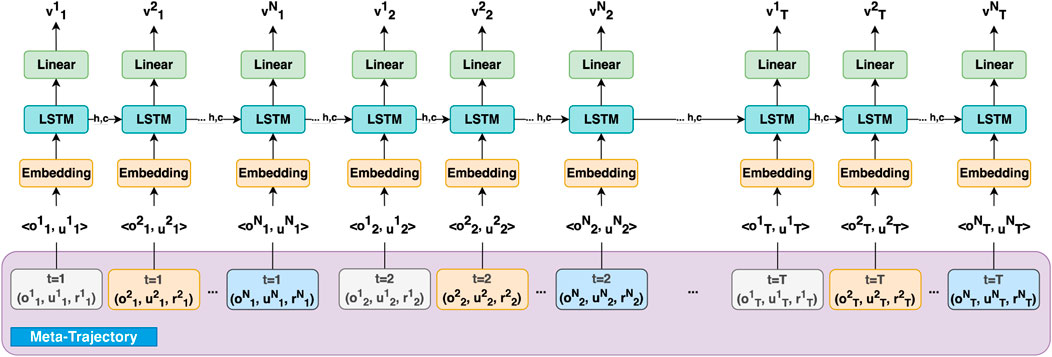
Figure 3. Centralized Critic Network Architecture, which utilizes the created meta-trajectory composed of the observations, actions, and rewards from all agents over multiple time-steps. The meta-trajectory allows the critic to evaluate the value function
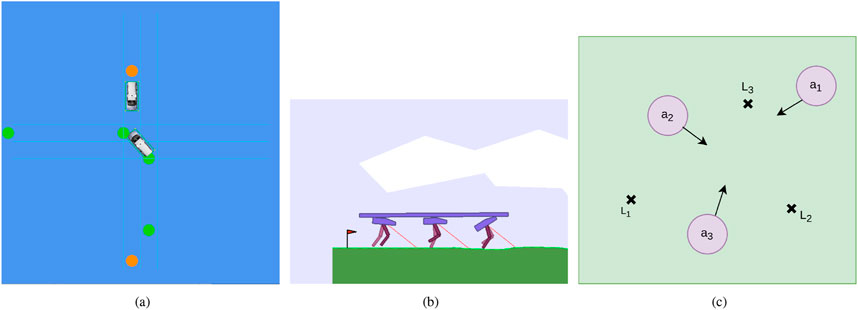
Figure 4. Considered MARL simulation environments (A) DeepDrive-Zero environment: an unprotected left turn scenario, (B) Multi-Walker environment, (C) Particle environment: cooperative navigation.
Each environment presents unique challenges related to agent cooperation, partial observability, and decentralized decision-making, allowing for a thorough evaluation of MACRPO’s performance. Check Supplementary Appendix A2 for more details about the environments.
5.2 Ablation study
Four ablations were designed to evaluate each novelty. The name of the method and the explanation shows which ablation has Feed-forward or LSTM or how information is shared in that ablation. In all cases, the parameter sharing proposed in Gupta et al. (2017) and Terry et al. (2020) was used:
Also, in order to see the effect of the
All experiments were repeated with identical random seeds for each method to reduce the effect of randomness. Hyperparameters used in MACRPO for three environments are detailed in Supplementary Appendix A4.
5.2.1 DeepDrive-Zero environment
We ran all ablations for ten random seeds in the DeepDrive-Zero environment to test our proposed method. We used self-play in simulations and used the latest set of parameters for actors in each episode. The results are shown in Figure 5. The x-axis shows the number of training iterations. In each iteration, we ran 100 parallel environments for 3,000 steps and collected data. Next, we updated actors and critic networks using the collected data. After each iteration, we ran the agents for 100 episodes, took the mean of these episodes’ rewards (the sum of all agents’ rewards), and plotted them. The shaded area shows one standard deviation of episode rewards. The hyperparameters used in the MACRPO algorithm are listed inSupplementary Table 2 (Supplementary Appendix A4).
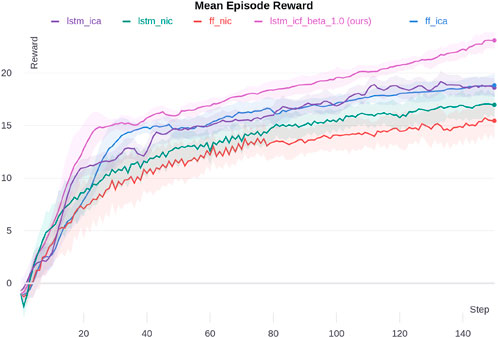
Figure 5. Mean episode reward for different ablations in the DeepDrive-Zero environment. The shaded area shows one standard deviation.
The proposed algorithm, LSTM-ICF, outperforms the ablations. The next best performances are for LSTM-ICA and FF-ICA, which are almost the same. Moreover, information integration in the advantage function, in both FF-ICA and LSTM-ICA, improves the performance compared to FF-NIC and LSTM-NIC; however, the achieved performance gain in the fully connected case is higher. The FF-ICA surpasses LSTM-NIC, which shows the effectiveness of sharing information across agents through the proposed advantage function, even without an LSTM layer. The addition of the LSTM layer in LSTM-ICF further enhances performance by capturing temporal dependencies between agents’ actions and observations, which are crucial in dynamic multi-agent environments like DeepDrive Zero. The LSTM enables the critic to remember past interactions and predict future dependencies, which provides a more holistic understanding of agent dynamics over time. This temporal information allows for more informed decision-making and improves the ability of agents to anticipate and respond to each other’s actions effectively. Consequently, the use of LSTM leads to a more coordinated and adaptive behavior across agents, which is reflected in the superior performance of LSTM-ICF compared to other ablations.
Figure 6 shows the analysis of the effect of different
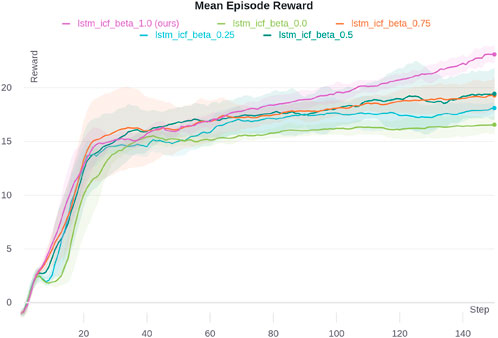
Figure 6. Mean episode reward for different
As
The
To achieve smooth driving performance, a curriculum-based learning method and a gradual weight increase of reward factors were used. The weights of Jerk, G-force, steering angle change, acceleration change, and going out of the lane in the reward function were gradually increased to
5.2.2 Multi-walker environment
We ran 20 parallel environments and 2,500 time steps during each update iteration for the Multi-Walker environment. After each iteration, we ran agents for 100 episodes and plotted the mean of these episodes’ rewards. Each episode’s reward is the sum of all the agents’ rewards. Ten different random seeds are used for each ablation. We also used the latest set of parameters for all actors. The hyperparameters used in the MACRPO algorithm are listedSupplementary Table 2 (Supplementary Appendix A4).
Figure 7 shows a massive performance improvement of our proposed method, LSTM-ICF with
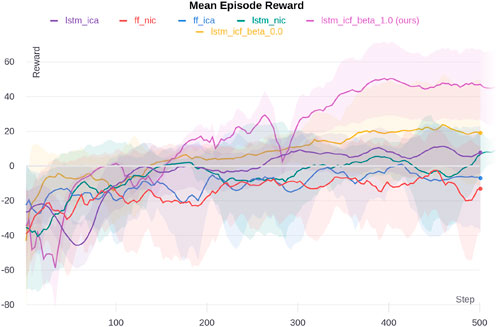
Figure 7. Multi-Walker simulation results for different ablations. The shaded area shows one standard deviation.
The effect of the
5.2.3 Cooperative navigation in particle environment
In the particle environment, in each iteration, we ran 20 parallel environments to collect data for 2,500 time steps and used that data to update the network. The agents were then evaluated using the trained weights for 100 episodes. We ran the simulation with six random seeds. MACRPO hyperparameters are shown in Supplementary Table 2 (Supplementary Appendix A4).
The results of this environment are depicted in Figure 8. Similar to the other two environments, the proposed LSTM-ICF with
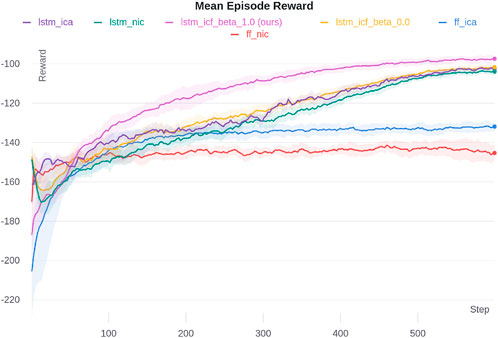
Figure 8. Particle environment simulation results for different ablations. The shaded area shows one standard deviation.
The effect of the
The results of the ablation study clearly demonstrate the impact of both proposed enhancements—information integration through the advantage function estimation and temporal dependency capture via the LSTM layer—on improving performance. The findings confirm that these improvements are not spurious but are directly attributable to the proposed modifications.
In general, the cases with the LSTM layer consistently perform better than the feed-forward counterparts, even in the FF-ICA case, which integrates information solely through the advantage function. This highlights the importance of capturing temporal dependencies via the LSTM network for enhanced coordination and navigation in highly interactive environments.
Our study also explored the role of the cooperation control parameter
Additionally, while both proposed ideas yield performance improvements, their relative effectiveness varies across environments. In the DeepDrive-Zero environment, information integration through the advantage function has a slightly greater impact than the LSTM layer. In contrast, the LSTM layer is more effective in the Multi-Walker environment, while in the Particle environment, both enhancements contribute equally to performance gains.
In our study, the tested environments—DeepDrive Zero, Multi-Walker, and Particle—are fully cooperative multi-agent settings, where agents benefit from high
A video of the trained model can be found in the supplementary materials.
5.3 Comparison to state-of-the-art methods
We compared the proposed method with several state-of-the-art algorithms in each environment. Our method is compared against several single-agent baselines with shared parameters across agents (DQN, RDQN, A2C, DDPG, PPO, SAC, TD3, APEX-DQN, APEX-DDPG, and IMPALA), which were tested in Terry et al. (2020). We also compared our method to state-of-the-art multi-agent approaches such as MAGIC, (Niu et al., 2021), IC3Net (Singh et al., 2019), GA-Comm (Liu et al., 2020), CommNet (Sukhbaatar et al., 2016), MADDPG (Lowe et al., 2017), RMAPPO (Yu et al., 2022), and QMIX (Rashid et al., 2018).
The architecture and hyperparameters used for PPO, IMPALA, A2C, SAC, APEX-DQN, Rainbow-DQN, DQN, APEX-DDPG, DDPG, TD3, and QMIX are taken from Terry et al. (2020) which has an open source implementation 1. For MADDPG (Lowe et al., 2017), we used the original source code 2, for RMAPPO (Yu et al., 2022) we used their open source code 3, and for MAGIC, IC3Net, CommNet, and GA-Comm we used the open source implementation 4. We performed hyperparameter tuning using grid search to optimize performance for each method.
Note that some of the official implementations of baselines we used here do not support both discrete and continuous action spaces and we did not modify the code. The non-reported results for some baselines in the paper’s tables and charts are due to this. In addition, we tried to use the discretized version of the DeepDrive-Zero environment for algorithms with discrete action space which may cause poor performance.
Each agent’s goal in MACRPO is to maximize the total reward of all agents, while the goal of other methods is to maximize the total reward of each agent without considering other agents’ rewards in their objective function. In order to have a more fair comparison, We report the result for our method when
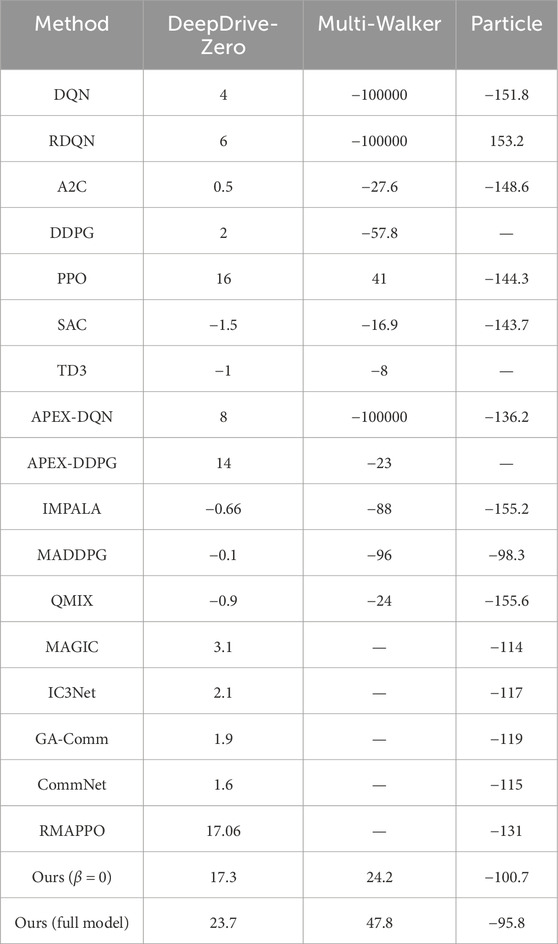
Table 2. Comparing performance of our method with state-of-the-art approaches. Numbers show the average reward in each environment for ten random seeds, except for the Multi-Walker environment which is 1,000 random seeds.
5.3.1 DeepDrive-Zero environment
In this environment, our full method and also the case with
5.3.2 Multi-walker environment
Similar to the previous environment, the proposed method outperformed other methods by a large margin with an average reward of 47.8. Next, PPO with parameter sharing had the second-best performance with a maximum average reward of 41. Our method with
5.3.3 Cooperative navigation in particle environment
As in both previous environments, our approach outperformed other approaches in this environment as well, although the difference was minor compared to MADDPG. Our method with
It is evident from the reported results that RMAPPO performance in the DeepDrive-Zero environment is satisfactory and comparable to our method in the case of
All hyperparameters for each algorithm are included in Supplementary Appendix A4.
The results show that the performance benefit given by the two proposed ways of sharing information across agents is significant such that the method outperforms state-of-the-art algorithms.
6 Conclusion and future work
In this paper, MACRPO, a centralized training and decentralized execution framework for multi-agent cooperative settings was presented. The framework is applicable to both discrete and continuous action spaces. In addition to parameter sharing across agents, this framework integrates information across agents and time in two novel ways: network architecture and the advantage estimation function. An ablation study in three environments revealed that both ways of information sharing are beneficial. Furthermore, the method was compared to state-of-the-art multi-agent algorithms such as MAGIC, IC3Net, CommNet, GA-Comm, QMIX, and MADDPG, as well as single-agent algorithms that share parameters between agents, such as IMPALA and APEX. The results showed that the proposed algorithm performed significantly better than state-of-the-art algorithms.
While MACRPO demonstrates strong performance in a range of tasks, there are some limitations. In environments with high-dimensional discrete action spaces, performance may be impacted due to the increased complexity of managing agent interactions. Additionally, MACRPO’s centralized critic, which processes a meta-trajectory of all agents, may face scalability challenges as the number of agents grows. For larger agent populations, integrating an attention mechanism could be a potential solution, allowing agents to selectively focus on critical information from others without processing data from all agents simultaneously. This enhancement could improve MACRPO’s efficiency and scalability in large-scale multi-agent environments.
Despite these limitations, MACRPO’s adaptable cooperation control parameter,
Data availability statement
The datasets presented in this study can be found in online repositories. The names of the repository/repositories and accession number(s) can be found in the article/Supplementary Material.
Author contributions
EK: Conceptualization, Data curation, Formal Analysis, Funding acquisition, Investigation, Methodology, Project administration, Resources, Software, Supervision, Validation, Visualization, Writing–original draft, Writing–review and editing. VK: Conceptualization, Data curation, Formal Analysis, Funding acquisition, Investigation, Methodology, Project administration, Resources, Software, Supervision, Validation, Visualization, Writing–review and editing.
Funding
The author(s) declare that no financial support was received for the research, authorship, and/or publication of this article.
Acknowledgments
The authors acknowledge the use of ChatGPT 4 for language improvement.
Conflict of interest
The authors declare that the research was conducted in the absence of any commercial or financial relationships that could be construed as a potential conflict of interest.
Publisher’s note
All claims expressed in this article are solely those of the authors and do not necessarily represent those of their affiliated organizations, or those of the publisher, the editors and the reviewers. Any product that may be evaluated in this article, or claim that may be made by its manufacturer, is not guaranteed or endorsed by the publisher.
Supplementary material
The Supplementary Material for this article can be found online at: https://www.frontiersin.org/articles/10.3389/frobt.2024.1394209/full#supplementary-material
References
Bansal, T., Pachocki, J., Sidor, S., Sutskever, I., and Mordatch, I. (2017). Emergent complexity via multi-agent competition. arXiv Prepr. arXiv:1710.03748.
Berner, C., Brockman, G., Chan, B., Cheung, V., Debiak, P., Dennison, C., et al. (2019). Dota 2 with large scale deep reinforcement learning. arXiv preprint arXiv:1912.06680.
Da Silva, F. L., and Costa, A. H. R. (2019). A survey on transfer learning for multiagent reinforcement learning systems. J. Artif. Intell. Res. 64, 645–703. doi:10.1613/jair.1.11396
Dosovitskiy, A., Ros, G., Codevilla, F., Lopez, A., and Koltun, V. (2017). Carla: an open urban driving simulator in Conference on robot learning (PMLR), 1–16.
Dresner, K., and Stone, P. (2008). A multiagent approach to autonomous intersection management. J. Artif. Intell. Res. 31, 591–656. doi:10.1613/jair.2502
Durugkar, I., Liebman, E., and Stone, P. (2020). Balancing individual preferences and shared objectives in multiagent reinforcement learning. Good Systems-Published Res., 2505–2511. doi:10.24963/ijcai.2020/347
Dutta, P. S., Jennings, N. R., and Moreau, L. (2005). Cooperative information sharing to improve distributed learning in multi-agent systems. J. Artif. Intell. Res. 24, 407–463. doi:10.1613/jair.1735
Foerster, J., Assael, I. A., De Freitas, N., and Whiteson, S. (2016). Learning to communicate with deep multi-agent reinforcement learning in Advances in neural information processing systems, 2137–2145.
Foerster, J., Farquhar, G., Afouras, T., Nardelli, N., and Whiteson, S. (2018). Counterfactual multi-agent policy gradients. Proc. AAAI Conf. Artif. Intell. 32. doi:10.1609/aaai.v32i1.11794
Gmytrasiewicz, P. J., and Doshi, P. (2005). A framework for sequential planning in multi-agent settings. J. Artif. Intell. Res. 24, 49–79. doi:10.1613/jair.1579
Gupta, J. K., Egorov, M., and Kochenderfer, M. (2017). Cooperative multi-agent control using deep reinforcement learning in International conference on autonomous agents and multiagent systems (Springer), 66–83.
Hansen, E. A., Bernstein, D. S., and Zilberstein, S. (2004). Dynamic programming for partially observable stochastic games. AAAI 4, 709–715. doi:10.5555/1597148.1597262
Hernandez-Leal, P., Kartal, B., and Taylor, M. E. (2019). A survey and critique of multiagent deep reinforcement learning. Aut. Agents Multi-Agent Syst. 33, 750–797. doi:10.1007/s10458-019-09421-1
Kaelbling, L. P., Littman, M. L., and Moore, A. W. (1996). Reinforcement learning: a survey. J. Artif. Intell. Res. 4, 237–285. doi:10.1613/jair.301
Kash, I. A., Friedman, E. J., and Halpern, J. Y. (2011). Multiagent learning in large anonymous games. J. Artif. Intell. Res. 40, 571–598. doi:10.1613/jair.3213
Kraemer, L., and Banerjee, B. (2016). Multi-agent reinforcement learning as a rehearsal for decentralized planning. Neurocomputing 190, 82–94. doi:10.1016/j.neucom.2016.01.031
Lazaridis, A., Fachantidis, A., and Vlahavas, I. (2020). Deep reinforcement learning: a state-of-the-art walkthrough. J. Artif. Intell. Res. 69, 1421–1471. doi:10.1613/jair.1.12412
Littman, M. L. (1994). Markov games as a framework for multi-agent reinforcement learning in Machine learning proceedings 1994 (Elsevier), 157–163.
Liu, Y., Wang, W., Hu, Y., Hao, J., Chen, X., and Gao, Y. (2020). Multi-agent game abstraction via graph attention neural network in The thirty-fourth AAAI conference on artificial intelligence, AAAI 2020, the thirty-second innovative applications of artificial intelligence conference, IAAI 2020, the tenth AAAI symposium on educational advances in artificial intelligence, EAAI 2020 (New York, NY, USA: AAAI Press), 7211–7218.
Lowe, R., Wu, Y. I., Tamar, A., Harb, J., Abbeel, O. P., and Mordatch, I. (2017). Multi-agent actor-critic for mixed cooperative-competitive environments in Advances in neural information processing systems, 6379–6390.
Matignon, L., Laurent, G. J., and Fort-Piat, N. L. (2012). Independent reinforcement learners in cooperative markov games: a survey regarding coordination problems. Knowl. Eng. Rev. 27, 1–31. doi:10.1017/s0269888912000057
Mordatch, I., and Abbeel, P. (2018). Emergence of grounded compositional language in multi-agent populations in Thirty-second AAAI conference on artificial intelligence.
Nguyen, T. T., Nguyen, N. D., and Nahavandi, S. (2020). Deep reinforcement learning for multiagent systems: a review of challenges, solutions, and applications. IEEE Trans. Cybern. 50, 3826–3839. doi:10.1109/tcyb.2020.2977374
Niu, Y., Paleja, R., and Gombolay, M. (2021). Multi-agent graph-attention communication and teaming in Proceedings of the 20th international conference on autonomous agents and MultiAgent systems, 964–973.
Rashid, T., Samvelyan, M., De Witt, C. S., Farquhar, G., Foerster, J., and Whiteson, S. (2018). Qmix: monotonic value function factorisation for deep multi-agent reinforcement learning. arXiv Prepr. arXiv:1803.11485.
Santara, A., Rudra, S., Buridi, S. A., Kaushik, M., Naik, A., Kaul, B., et al. (2021). Madras: multi agent driving simulator. J. Artif. Intell. Res. 70, 1517–1555. doi:10.1613/jair.1.12531
Schulman, J., Wolski, F., Dhariwal, P., Radford, A., and Klimov, O. (2017). Proximal policy optimization algorithms. arXiv preprint arXiv:1707.06347.
Shalev-Shwartz, S., Shammah, S., and Shashua, A. (2016). Safe, multi-agent, reinforcement learning for autonomous driving. arXiv Prepr. arXiv:1610.03295.
Singh, A., Jain, T., and Sukhbaatar, S. (2019). Learning when to communicate at scale in multiagent cooperative and competitive tasks in 7th international Conference on learning representations, ICLR 2019. New Orleans.
Sukhbaatar, S., Szlam, A., and Fergus, R. (2016). Learning multiagent communication with backpropagation in Advances in neural information processing systems 29: annual conference on neural information processing systems 2016, december 5-10, 2016. Editors D. D. Lee, M. Sugiyama, U. von Luxburg, I. Guyon, and R. Garnett (Barcelona, Spain), 2244–2252.
Sunehag, P., Lever, G., Gruslys, A., Czarnecki, W. M., Zambaldi, V. F., Jaderberg, M., et al. (2018). Value-decomposition networks for cooperative multi-agent learning based on team reward. Aamas 2085–2087.
Tan, M. (1993). Multi-agent reinforcement learning: independent vs. cooperative agents in Proceedings of the tenth international conference on machine learning 330–337.
Terry, J. K., Grammel, N., Hari, A., Santos, L., Black, B., and Manocha, D. (2020). Parameter sharing is surprisingly useful for multi-agent deep reinforcement learning. arXiv Prepr. arXiv:2005.13625.
Vinyals, O., Babuschkin, I., Czarnecki, W. M., Mathieu, M., Dudzik, A., Chung, J., et al. (2019). Grandmaster level in starcraft ii using multi-agent reinforcement learning. Nature 575, 350–354. doi:10.1038/s41586-019-1724-z
Wang, R. E., Everett, M., and How, J. P. (2020). R-maddpg for partially observable environments and limited communication. arXiv preprint arXiv:2002.06684.
Xiao, Y., Lyu, X., and Amato, C. (2021). Local advantage actor-critic for robust multi-agent deep reinforcement learning in 2021 international symposium on multi-robot and multi-agent systems (MRS) (IEEE), 155–163.
Ying, W., and Dayong, S. (2005). Multi-agent framework for third party logistics in e-commerce. Expert Syst. Appl. 29, 431–436. doi:10.1016/j.eswa.2005.04.039
Yu, C., Velu, A., Vinitsky, E., Gao, J., Wang, Y., Bayen, A., et al. (2022). The surprising effectiveness of PPO in cooperative multi-agent games in Thirty-sixth conference on neural information processing systems datasets and benchmarks track.
Keywords: cooperative, policy, multi-agent, information sharing, interaction, reinforcement learning
Citation: Kargar E and Kyrki V (2024) MACRPO: Multi-agent cooperative recurrent policy optimization. Front. Robot. AI 11:1394209. doi: 10.3389/frobt.2024.1394209
Received: 01 July 2024; Accepted: 25 November 2024;
Published: 20 December 2024.
Edited by:
Herbert Glenn Tanner, University of Delaware, United StatesReviewed by:
Kuppan Chetty Ramanathan, SASTRA Deemed to be University, IndiaBin-Bin Hu, University of Groningen, Netherlands
Copyright © 2024 Kargar and Kyrki. This is an open-access article distributed under the terms of the Creative Commons Attribution License (CC BY). The use, distribution or reproduction in other forums is permitted, provided the original author(s) and the copyright owner(s) are credited and that the original publication in this journal is cited, in accordance with accepted academic practice. No use, distribution or reproduction is permitted which does not comply with these terms.
*Correspondence: Eshagh Kargar, ZXNoYWdoLmthcmdhckBhYWx0by5maQ==
 Eshagh Kargar
Eshagh Kargar Ville Kyrki
Ville Kyrki